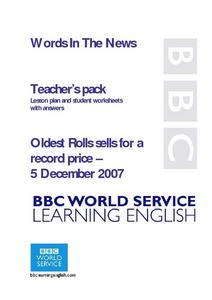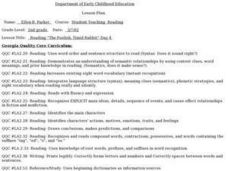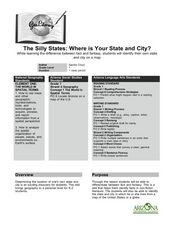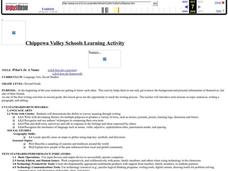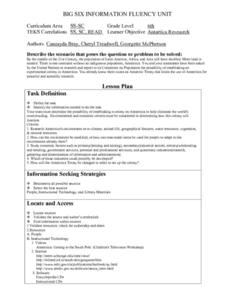Curated OER
Open Wide at the Dentist, "Aaaahh"
Study the /o/ in both written and spoken words by reciting a tongue twister and making words using Elkonin letterboxes. Next, write a message about frogs using /o/ words. Finally, listen to a short book talk on "Doc in the Fog" before...
Curated OER
Great Gullah Story Telling Packet
Sixth graders examine the Creole language known as Gullah which is a form of speech comprised of a number of unrelated languages. They determine how slaves used this to communicate so that slave masters would not be able to understand...
Curated OER
Oldest Rolls Sells for a Record Price
Students study, analyze and critique a newspaper article on the world's oldest surviving Rolls Royce car that had sold at an auction in London for just over $7,000,000. They assess the key vocabulary terms used within the article, how to...
Curated OER
Language Arts: Plotting Stories
Second graders read the story, "The Foolish, Timid Rabbit," as part of a unit on appearances. After reading with partners, they write their own stories that include elements about some forms of matter from their science studies. Students...
Curated OER
Rainforest Animals
Third graders make a presentation or a booklet to help class learn about rain forest animals. They sketch or use a few words to describe the picture that goes with the facts. They use the computer to make a presentation or use...
Curated OER
"You Shall Do Your Best Endeavor" - Working With Primary Documents
Students read and interpret primary source documents regarding historic Jamestown. In small groups, they read the primary documents, answer questions, and view online maps of Jamestown Island and Virginia.
Curated OER
Romanian Spy Kids
Students discuss spies and read a newspaper article about students spying on their parents in Romania. Working in groups, they generate a list of the perfect spy qualities.
Curated OER
The Silly States: Where Is Your State and City?
First graders read The Scrambled States of America and discuss whether it is real or fantasy as compared to the United States. In this geography lesson, 1st graders identify their city or state on a map and work in groups to color the...
Curated OER
Success and Fame
Learners explore success and fame. In this success lesson plan students discuss famous quotations about success. Learners give their own definitions of success.
Curated OER
The Pan-American Exposition of 1901
Students examine the impact of the 1901 World's Fair. In this lesson on invention and politics, students watch a video then conduct Internet research in order to learn about the Pan American Exposition. Students will create a brochure...
Curated OER
World War I WebQuest
Students reflect on the events before, during and after World War I. In this World History activity, students complete a WebQuest that focuses specifically on the key events of World War I.
Curated OER
The Holocaust
Tenth graders reflect on the effects of the Holocaust and the events leading up to World War II. In this World History instructional activity, 10th graders complete several activities, including a WebQuest, that analyze the...
Curated OER
School
Students learn new vocabulary and answer discussion questions about the concept of going to school and education and then they design the perfect school. In this school lesson plan, students present their schools to the class and they...
Curated OER
First Letter Changes
Students use the books of Eric Carle to change the first letter in a word to see a new word. In this phonics lesson plan, students change the beginning letters in poems and books.
Orange County Department of Education
Integrity and "Thank You, M'am"
Ninth graders explore the definition of integrity through a class discussion. They provide positive/negative examples from the story and their own experiences. Students determine character traits by analyzing the dialogue in a short...
Curated OER
Onomatopoeia
Fifth graders investigate onomatopoeia. In this reading lesson, 5th graders create a list of onomatopoeic words from books read and brainstorm words of their own in small groups.
Curated OER
Color, Play, Podcast
Students encounter the format of a podcast and plan what content they will include. They work in small groups or with the whole class to develop an outline. Students practice reading their scripts to other students.
Curated OER
The Underground Railroad
Fourth graders participate in a literature circle after reading a book about the Underground Railroad. They discuss their selected book with their literature circle group, and complete a handout about their role in the circle. Students...
Curated OER
Egyptian Mummification
Students explore Egyptian mummification and burial practices. They conduct research on gods, goddesses, afterlife, and mummification. Students dissect and mummify a frog "pharaoh and create a tomb wall for their frog "pharaoh."
Curated OER
Family Stories and Personal Narratives
Fourth graders read various stories in their literature books about families. Individually, they make a timeline showing the most important events in their lives. They bring in one artifact from their lives and write a paper about it...
Curated OER
What's In A Name
Second graders write a paragraph about their findings on what their name represents. In this writing lesson plan, 2nd graders will research their name and why they were named that. They will draw a picture that represents them along with...
Curated OER
Famous People Research Project
Fourth graders research a famous person in Michigan history. They will use at least three different resources including technology to conduct their research. They then will use various forms of technology to create individual research...
Curated OER
Prehistoric Native American Lesson Plan: Pictionary with the Past
Students participate in a vocabulary exercise at a website dedicated to Prehistoric Native Americans.
Lubbock Independent School District
Antarctica Research
Sixth graders determine the possibility of establishing a colony on Antarctica to help eliminate the world's overcrowding. They consider environmental and economic criteria in determining how this colony functions ans is expected to do...




